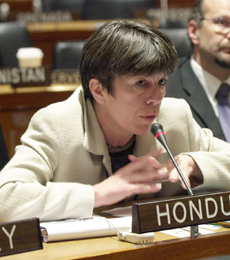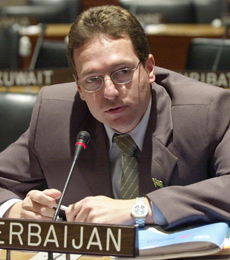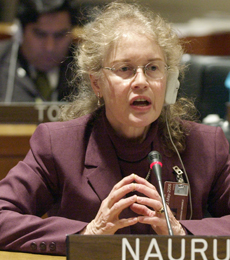 |
||
|
published by IISD, the International Institute for Sustainable Development
in cooperation with the UNDP Secretariat |
|||
|
Special Report on Selected Side Events at the Fourteenth Session of the Commission on Sustainable Development (CSD-14)
|
|||||
| 1-12 May 2006 | United Nations Headquarters, New York | |||||
 |
 |
|||
 |
||||
Events convened on Tuesday, 9 May 2006
|
UN Reform and the Environment Presented by UNEP |
||||
|
Kilaparti Ramakrishna, UNEP, noted cross-sectoral work undertaken by UNEP, including with UNDP and WHO, and the need to further involve major groups and civil society. Werner Obermeyer, UNEP, gave an overview of the General Assembly’s informal consultations on the institutional framework for the UN’s environment work, and the UN High Level Panel on System Wide Coherence, noting that the latter may be able to come up with more far reaching recommendations than what might have come from an intergovernmental process. He noted likely recommendations, including that the environmental component of sustainable development needs to be strengthened and that UN policy needs de-fragmentation. Saradha Iyer, Third World Network, noted that this process has much to learn from UNEP in terms of civil society engagement. She said that while NGOs welcome the attention to environmental concerns, they are skeptical whether this will address the “green gap” of implementation, adding that a rushed debate is likely to do more harm than good. She urged that sustainable development should be the overarching framework, and to ensure that this does not become merely a cost-cutting exercise. Andrew Deutz, IUCN, noted that in theory, the two reform processes should be mutually reinforcing. He noted the risk that the environment may remain marginalized or be pitted against development, but said that the opportunity exists to integrate and mainstream environmental issues across many UN agencies, along with gender and human rights. For long term reforms, he encouraged improvement of the relationship between multilateral environmental agreements, and to streamline reporting requirements. Esther Neuhouse, Brazilian Forum of NGOs and Social Movements for the Environment and Development, noted that the UN’s legacy to date has been to step back from previous environmental commitments, and that the implementation gap is increasing. She urged further technology transfer, capacity building, and civil society engagement, and that UNDP remain in Nairobi, Kenya. She cautioned that the role of the UN risks being marginalized, and urged greater engagement of grassroots organizations, adequate funding from OECD countries, and regional cooperation. Gordon Shepherd, WWF, expressed alarm that environmental agreements are increasingly shying away from using precautionary language, producing institutions that react to, instead of prevent problems. He lamented the collapse of environmental funding, citing the US cuts to the GEF, adding that the environment is in the worst condition it has ever been, and that human consumption is rising rapidly. He cautioned against consolidating environment and development programmes, noting that environment would get lost in this debate. |
||||
|
|||
|
Steps Toward a Sustainable Energy Future Presented by Citizens United for Renewable Energy for Sustainability (CURES) |
||
|
Jürgen Maier, German NGO Forum on Environment and Development, introduced the event by presenting the CURES network.
Ewah Eleri, International Center for Energy, Environment and Development, Nigeria, shared his country’s competing visions for energy and development: business as a nation drowning in oil, or the growing vision of sustainable development. He emphasized that only government can provide electricity to 100 million Nigerians and addressed the need for: combating corruption at home and abroad; holding Trans National Corporations accountable for harm caused in Nigeria; and international cooperation, notably the exchange of ideas and best practices. Ibrahim Togola, Mali Folkecenter, described why the use of fossil fuels, especially when imported, is not a sage development strategy for West Africa. He said that: a country that masters its energy production, masters its economic development; considering Africa’s poor level of economic development, it is essential to give priority to the use of indigenous natural resources for modern energy supply; and added that the effort should focus on the sustainable use of resources in order to achieve sustainable development. Nikki Skuce, Canadian Renewable Energy Alliance, described how the fossil fuel lobby, in response to peak oil, is trying to achieve a green image, highlighting the examples of Exxon Mobil and Chevron. She explained the trend of moving towards unconventional sources of fossil fuels, such as coal-bed methane and the Alberta tar sands, saying that these options are less efficient and more environmentally destructive. Skuce acknowledged that fossil fuels are likely to be part of the energy mix, yet emphasized the need to maximize the full potential of renewable energy and energy efficiency. David Waskow, Friends of the Earth, U.S., discussed how the World Bank is failing to adequately finance renewable energy for development, highlighting the Clean Energy and Development Report. Noting the World Bank’s commitment of a 20% annual increase in financing renewable energy, and that they barely met their target for 2005, Waskow said the World Bank will have to intensify its commitment to financing renewable energy and energy efficiency, use consistent baselines for calculating its increases, and deploy more of its own funds. Andrei Ozharovskiy, Anped Russia, said that Russia and the G8 energy agenda is bound to fail, because both fossil fuels and nuclear energy are “dead end” energy options. He said that when civil society presented their vision for Russia’s energy future in preparation for the July 2006 G8 Summit in St. Petersburg of all nuclear energy subsidies stopped along with the phase out of nuclear systems, they were not heard. Ozharovsky closed by saying the concept of “keeping all doors open” is senseless, especially when best practices have been identified that exclude nuclear energy as an option. |
||
|
|||
|
Enhancing Energy and Transport Access for the Urban Poor Residing in Informal Settlement in Developing Country Cities Presented by UN-HABITAT |
|||||
|
Brian Williams, UN-HABITAT, introduced the session, highlighting it as the only side event that specifically addressed the urban poor. He provided an overview of UN-HABITAT’s work in this area, highlighting its infrastructure branch, and said it aims to, amongst other things, increase the efficiency of existing transport operations through the improved planning and management of all modes of transport. José Goldemberg, Secretary of State, São Paulo, described how in 1982, the energy company in São Paulo electrified 100,000 people living in the slums over four years, which decreased criminality and population growth. Goldemburg emphasized this was accomplished without a high cost, and used subsidies that tapered off. Walter Hook, Institute for Transportation and Development Policy, discussed improving mobility for the urban poor while saving energy. He highlighted Bogota, Colombia’s TransMilenio, their bus rapid transport system built in the late 1990’s that moves one million people per day, incorporates bicycle and pedestrian-only streets, and revitalized the city center. He emphasized that the system links low income neighborhoods to rapid transport. Gregory Woodsworth, UNDP, discussed regional energy access to modern energy services in the East Africa Community, highlighting their target of providing access to reliable modern energy services for all urban and peri-urban poor by 2015. He said that providing energy that is high impact, low cost and scaleable will require hooking into the grid where it currently exists. Vijay Modi, Columbia University, said that providing electricity to people in urban and peri-urban areas in Senegal who have access to the electricity grid would cost $4 per person, saying that this is feasible. In terms of cooking fuel, he noted the need to solve the problem of targeting the urban poor for subsidies, and ensuring that the resources are sustainably produced, highlighting the noteworthy example of charcoal production in Chad. Vincent Kitio, UN-HABITAT, presented the Best Practices Programme, which uses renewable energy to promote urban agriculture and ensure food security. Kitio provided renewable energy best practices examples including a waterwheel for irrigation in Medinet El Faiyum, Egypt, and traditional wind pumps in Crete, Greece. John Spears, International Center for Sustainable Development, Inc., described the construction of Earth Homes in Grenada, built after hurricane Ivan, saying they use local materials to meet all the life support needs of the occupants, without the need for central power, water or sewers and can survive most natural disasters and costs less than the combined mortgage and utility payments of a conventional home. |
|||||
|
|||
|
International Cooperation on Bioenergy Presented by FAO |
||
|
Jeffrey Tschirley, Environment and Natural Resource Services, FAO, presented the international bioenergy platform (IBEP), noting that the rise of this sector will produce winners and losers, and that there is a need for a neutral forum in which to discuss issues related to bioenergy trade and policy integration, and to ensure efficient and equitable access. He noted that the IBEP will provide information for decision making, institutional capacity building, and integration of production and utilization. He discussed IBEP’s application, including regional and national strategies, noting a number of IBEP analysis and decision-making tools. He noted concern over the relationship of food security and bioenergy, adding that an initial analysis of tradeoffs is underway.
Andre Faaij, Utrecht University, said that bioenergy’s potential is vast, and described developments in the international bioenergy markets, notably the trade in liquid and solid biofuels. He presented the example of Mozambique, illustrating the potential for increased agricultural efficiency that would enable the production of bioenergy at one Euro per joule, capable of competing with coal. He said that a third of the world’s energy needs could be met using 10% of the world’s land surface for the production of bioenergy, representing a US$1-3 trillion market. Faaij highlighted key links to rural development, and the need to take local conditions into consideration. Corrado Clini, Ministry for the Environment and Territory, Italy, discussed the Global Bioenergy Partnership, launched at the Gleneagles G-8 Summit, which attempts to reconcile needs for food, energy, and climate security. He stressed the need to create the necessary market conditions for bio-energy to work. Lucas Assunção and Simonetta Zarrilli, UN Conference on Trade and Development (UNCTAD), presented the UNCTAD Biofuels initiative, created in June 2005, which serves as a meeting point for developing countries to discuss biofuel development. They described work underway, including a paper on trade flows, another on CDM, and technical cooperation and collaboration with academia. They remarked on the expansion of bioethanol, with Brazil currently dominating this field. They noted that tariffs may pose a threat to biofuel’s potential to compete with fossil fuels. She said that although there is a potential for enhanced trade to help meet development goals, land scarcity and technology access may pose barriers. Participants discussed: the potential for conflicts of interest for industry, the need to integrate all sectors involved, the potential to use fast-growing micro-algae for bioenergy, and competition for land. |
||
|
|||
|
||
|
Click the above button to go back to our ENB main coverage
|
||
|
|
|
|
|
||
|
-tn.jpg)
-tn.jpg)
-tn.jpg)
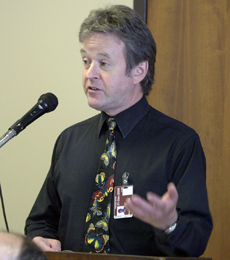
-tn.jpg)
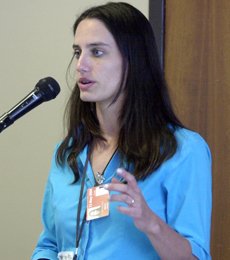

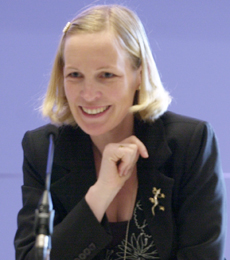
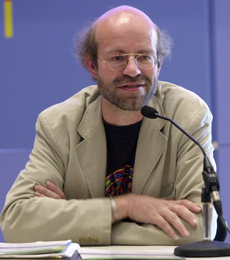
-tn.jpg)
-tn.jpg)
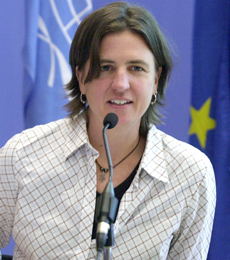
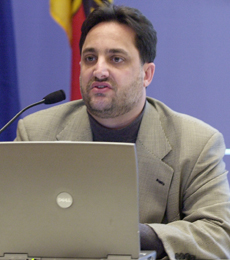
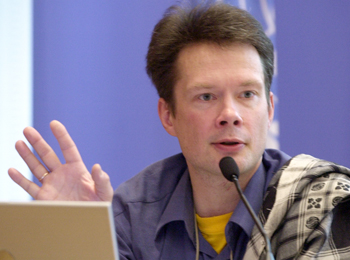
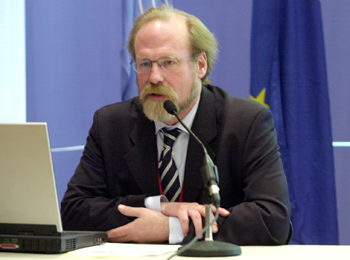
-tn.jpg)
-tn.jpg)
-tn.jpg)
-tn.jpg)
-tn.jpg)
-tn.jpg)
-tn.jpg)
-tn.jpg)

-tn.jpg)
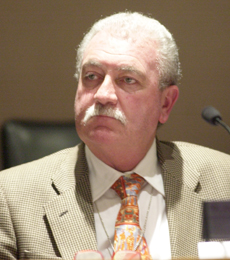
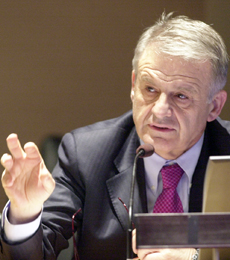
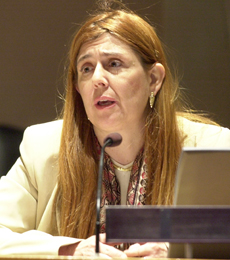
-tn.jpg)


